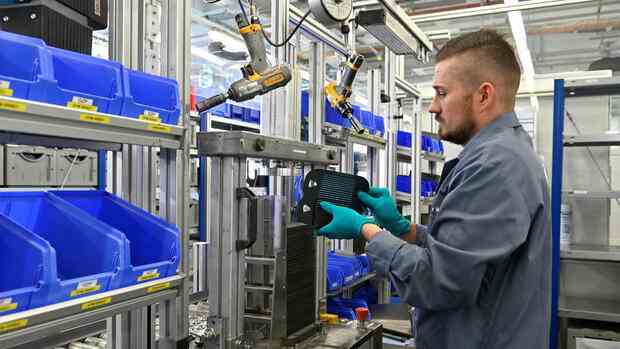According to financial circles, the Dresden start-up is already negotiating a new cash injection.
(Photo: Reuters)
Berlin The Cologne translation service DeepL is the youngest unicorn from Germany. At the beginning of the year, the start-up raised fresh money and has since been valued by investors at more than one billion euros. But bets are already running as to who will be included next in the coveted genus of mythical animals.
The Tech Tour platform, an association of leading European investors, has compiled a list of the 50 fastest growing venture capital-financed technology companies in Europe, all of which are already valued at more than 100 million euros and have the potential to become a unicorn in the future – i.e. with be valued at more than one billion euros.
Eleven of the Einhorn candidates come from Germany. These include the energy start-up 1Komma5 from Hamburg, Navvis from Munich, which creates digital copies of buildings, and the Dresden-based hydrogen company Sunfire, which according to financial circles is already negotiating a new cash injection that would allow the company to reach the billion dollar valuation .
Four of the eleven candidates from Germany come from the fields of energy and sustainability. So also Hydrogenius from Erlangen. The company develops hydrogen fuel cells based on a liquid organic hydrogen carrier, the so-called LOHC (Liquid Organic Hydrogen Carrier) and is thus building on a trend topic. “Governments and companies are looking for solutions that avoid significant investments in new storage, transport and liquefaction infrastructures,” says strategy chief Andreas Lehmann. LOHC technology binds hydrogen to a non-explosive, flame-retardant thermal oil that is less dangerous than diesel.
The company intends to raise the next round of financing this year. It is unclear whether unicorn status can then be achieved.
Financing process takes longer
Because in the middle of the turnaround in interest rates, persistent inflation and economic weakness, many venture capitalists are reluctant to put fresh money into start-ups. That’s why not as many unicorns are created as at the height of the corona pandemic. The unicorn status ennobles founders as well as investors, as it promises particularly high returns on later sales or IPOs.
Also read: Start-up outlook for 2023: Hardly any IPOs, falling company valuations, more insolvencies
“All 50 companies have the potential for a valuation of one billion euros,” says Falk Mueller-Veerse, chairman of the Tech Tour selection committee and partner at investment bank Bryan, Garnier & Co. But given the economic challenges, most companies are likely to stay open longer on the waiting lists: “DThe size of the financing rounds is currently falling significantly. The young companies should now plan significantly more time until the successful conclusion of a financing process.”
To determine the 50 start-ups, more than 90 investors looked at around 300 privately financed European technology companies with a valuation of less than one billion euros and identified the most promising candidates.
In addition to 1Komma5, Navvis, Sunfire and Hydrogenius, they own medical software company Caresyntax, healthcare start-up Ada Health, hybrid primary care provider, Avi Medical, biotech company Resolve, power-to-gas company Electrochaea, the IoT platform HiveMQ and the software company Y42 from Germany for particularly promising.
Former Tesla Germany boss Philipp Schröder founded 1Komma5.
In the past, Tech Tour has often been right about its lists. Former candidates such as Getyourguide, N26, Chrono24, WeFox, Mambu or DeepL now belong to the German unicorns.
Just like from Germany, this time eleven start-ups come from France and nine from Great Britain. Six are based in Switzerland and four in Finland. AlOnly the companies on Tech Tour’s top 50 list were able to collect more than 1.9 billion euros in 2022. Of the German candidates, 1Komma5 has received the most money with 300 million euros.
In the past year, the number of new unicorns has fallen significantly compared to the previous year: while in 2022, according to London-based venture capitalist Atomico’s annual report on the state of the European start-up scene, 31 new start-ups were created, valued at more than one billion , it had been 105 in 2021. At the end of the year, Europe counted a total of around 352 so-called unicorns – including 36 from Germany.
More: Bad mood: This is why it is becoming more difficult for start-ups to get capital

